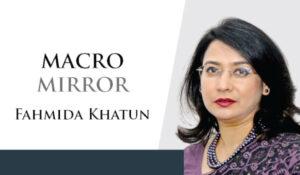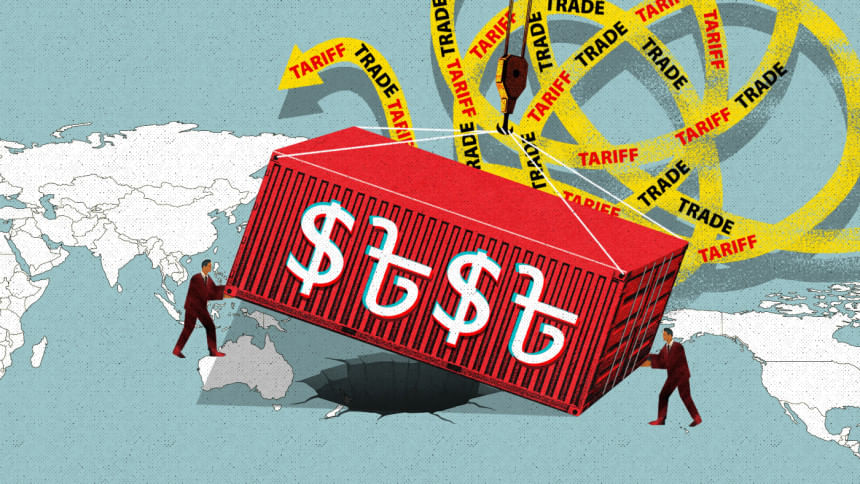Originally posted in The Daily Star on 26 August 2025
 The global economy is entering a more fragmented and protectionist phase. Economies around the world are raising tariffs, tightening trade-defence tools, and tying industrial policies to local content rules—that is, a certain percentage of domestically sourced goods must be present in production. For low-income countries, these changes coincide with shrinking aid budgets and a slowdown in global growth. This has created heightened risks for export-led development models that depend on predictable market access and concessional finance. The world of trade and development finance is becoming less reliable and more uncertain than it was even a decade ago.
The global economy is entering a more fragmented and protectionist phase. Economies around the world are raising tariffs, tightening trade-defence tools, and tying industrial policies to local content rules—that is, a certain percentage of domestically sourced goods must be present in production. For low-income countries, these changes coincide with shrinking aid budgets and a slowdown in global growth. This has created heightened risks for export-led development models that depend on predictable market access and concessional finance. The world of trade and development finance is becoming less reliable and more uncertain than it was even a decade ago.
What distinguishes today’s protectionism is not only its scale but also its scope. The World Trade Organization (WTO) reports that by 2024, import restrictions affected $2.94 trillion of global imports, equal to 11.8 percent of total trade, up from 9.9 percent the previous year. This shows that restrictions are accumulating without meaningful reversal. In April 2025, the WTO lowered its trade outlook, warning that new tariffs and higher trade-policy uncertainty would lead to a 0.2 percent contraction in global merchandise trade in 2025, with only a modest recovery expected the following year. These cuts to projections are unusually steep and linked explicitly to policy choices, rather than to cyclical economic weakness, showing how policy-driven trade frictions now impact global commerce.

Meanwhile, official development assistance (ODA) is also weakening. The Organisation for Economic Co-operation and Development (OECD) reveals that ODA fell in 2024 for the first time in six years. Also, in 2024, donor countries spent 17.3 percent less of their aid budgets on refugee costs within their borders compared to 2023. The OECD projects that ODA to poorer countries could fall by another 9 to 17 percent in 2025. For low-income economies, this means that aid flows are shrinking precisely when trade is becoming more expensive and uncertain, while debt and climate-related pressures are intensifying.
The broader economic context does little to offset these headwinds. According to June 2025 Global Economic Prospects of the World Bank, global growth is forecasted to slow to 2.3 percent in 2025, with most economies expanding more slowly than they did last year. In parallel, the April 2025 report of the WTO indicates that reciprocal tariffs and policy uncertainty would deepen trade contraction in 2025, impacting low-income and least developed countries the most.
Advanced economies are dealing with this new environment by combining protectionist measures with industrial promotion. Tariff shields are being paired with subsidy-heavy reindustrialisation strategies in areas such as green technology, semiconductors, and critical minerals. Emerging economies are responding in different ways. Aided by diversification and a deepening manufacturing base, Vietnam has sustained rapid export growth in 2025 despite tariff uncertainty. However, the country remains exposed to policy swings in its major markets. Thus, countries which are most able to plug into diversified value chains can still thrive even as global rules fray.
Regional integration has also emerged as an important coping strategy. In Africa, the African Continental Free Trade Area (AfCFTA) is seen as a mechanism to open alternative markets, deepen regional value chains, and reduce over-reliance on any single external partner. As the agreement progresses beyond pilot programmes, the speed of regulatory and trade-facilitation reforms will determine how quickly firms can take advantage of the new opportunities.
For low-income countries, navigating this growing protectionist world begins with recognising that old assumptions about trade and aid can no longer be relied upon. Protecting and diversifying market access is crucial. Countries must maximise the use of existing trade preference schemes, negotiate improvements in rules of origin, and invest in the compliance infrastructure needed for standards, traceability, and sustainability reporting. UNCTAD’s Trade and Development Report 2024 emphasises that in a low-growth and high-debt environment, development strategies should be reoriented toward building productive capacities and moving up value chains to reduce vulnerability to sudden shocks in preferences. At the same time, investment in trade facilitation and services has become a priority. Both the WTO and the World Bank underscore the resilience of services and digitally delivered trade. By modernising ports, customs systems, and digital infrastructure, low-income countries can raise their competitiveness, attract investment, and offset some of the pressures from tariffs and shrinking aid.
Rebuilding fiscal space and development finance is equally important. With ODA stagnating and humanitarian needs growing, domestic revenue mobilisation must improve, and subsidy reforms must be carefully sequenced to protect vulnerable groups while creating space for productive public investment. The apprehension about sharp reductions in ODA to the poorest countries highlights the urgency of diversifying financing sources and improving the quality and transparency of public spending. Another imperative is to increase flexibility in supply chains. Low-income countries should seek to participate in multiple regional arrangements, negotiate mutual recognition agreements to lower non-tariff costs, and help firms broaden their supplier bases. At the enterprise level, building the capacity to meet environmental and labour standards demanded by global buyers has become essential for maintaining access to key markets.
Bangladesh provides a vivid example of the challenges and opportunities in this new environment. The country is scheduled to graduate from the LDC category in November 2026, which means it will lose some of the special trade preferences it currently enjoys. Its export structure remains heavily concentrated in ready-made garments (RMG) and is dependent on the US and EU markets, leaving it highly sensitive to changes in preferences and buyer behaviour. RMG exports to the EU rose strongly in early 2025, underscoring Bangladesh’s competitiveness. However, the impact of the new tariff regime should be closely monitored and preparations made accordingly.
The government has begun preparing for these changes. Under IMF-supported programmes, Bangladesh has committed to macroeconomic stabilisation, tax and customs modernisation, and structural reforms to improve the investment climate. These reforms will lower trade costs, support diversification, and help firms meet compliance requirements in stricter markets. For the EU, Bangladesh’s path after graduation depends on access to the new Generalized Scheme of Preferences Plus (GSP+), which requires ratifying and effectively implementing a larger set of international conventions, stricter monitoring, and tougher rules of origin. Securing GSP+ is essential for Bangladesh’s future competitiveness in its largest export market.
Even if Bangladesh succeeds in gaining GSP+ status, broader global shifts mean the country must still adapt. Moving up the value chain is essential. This means scaling up production through technology, investing in design and branding services, and expanding into apparel-adjacent logistics and testing. These sectors are more resilient to tariff changes and can meet the growing demand for speed, traceability, and sustainability. Trade facilitation reforms must also deliver tangible results. Customs systems need full digitisation, single-window operations should be fully integrated with port systems, and clearance times must fall to levels that encourage diversification into pharmaceuticals, IT-enabled services, light engineering, and agro-processing. Diversification of export markets is another priority. Bangladesh needs to strengthen trade ties in Asia, the Middle East, and Africa to reduce dependence on the traditional markets.
In a protectionist era, preparation itself becomes a source of competitiveness, and Bangladesh must move faster to protect its hard-won gains.
Dr Fahmida Khatun is executive director at the Centre for Policy Dialogue (CPD). Views expressed in this article are the author’s own.


